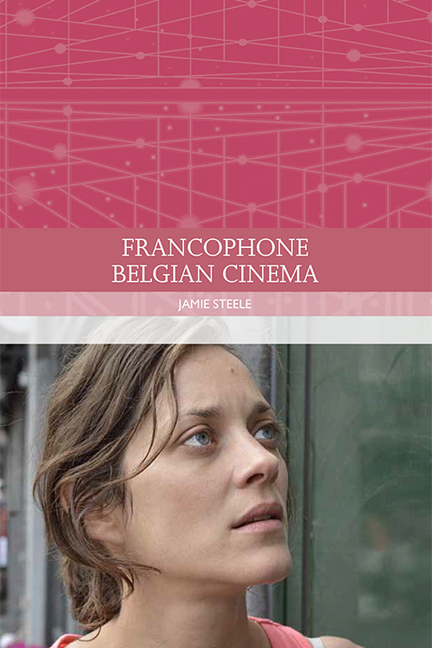Book contents
- Frontmatter
- Contents
- List of Figures
- Acknowledgements
- Traditions in World Cinema
- Introduction: Regional/National/Transnational Debates in Francophone Belgian Cinema
- 1 The (Francophone) Belgian Film Ecosystem: Trends in Production, Distribution and Exhibition
- 2 ‘No Future’: Social Marginalisation, Social Precariousness and Depictions of Seraing in Le gamin au vélo (Jean-Pierre and Luc Dardenne, 2011) and Deux jours, une nuit (Jean-Pierre and Luc Dardenne, 2014)
- 3 ‘Stills’ and Fragmented Families: Contemplating the Private Sphere in Joachim Lafosse’s Wallonia
- 4 From Slag Heaps to Cliffs: The ‘Marked’ Regional Landscape in Cages (Olivier Masset-Depasse, 2006)
- 5 The Francophone Belgian Road Movie: Eldorado (Bouli Lanners, 2008) and Ultranova (Bouli Lanners, 2005)
- 6 Lucas Belvaux’s Return: The Thriller Genre and Heists in Liège
- Conclusion
- Works Cited
- Films Cited
- Index
2 - ‘No Future’: Social Marginalisation, Social Precariousness and Depictions of Seraing in Le gamin au vélo (Jean-Pierre and Luc Dardenne, 2011) and Deux jours, une nuit (Jean-Pierre and Luc Dardenne, 2014)
Published online by Cambridge University Press: 29 April 2021
- Frontmatter
- Contents
- List of Figures
- Acknowledgements
- Traditions in World Cinema
- Introduction: Regional/National/Transnational Debates in Francophone Belgian Cinema
- 1 The (Francophone) Belgian Film Ecosystem: Trends in Production, Distribution and Exhibition
- 2 ‘No Future’: Social Marginalisation, Social Precariousness and Depictions of Seraing in Le gamin au vélo (Jean-Pierre and Luc Dardenne, 2011) and Deux jours, une nuit (Jean-Pierre and Luc Dardenne, 2014)
- 3 ‘Stills’ and Fragmented Families: Contemplating the Private Sphere in Joachim Lafosse’s Wallonia
- 4 From Slag Heaps to Cliffs: The ‘Marked’ Regional Landscape in Cages (Olivier Masset-Depasse, 2006)
- 5 The Francophone Belgian Road Movie: Eldorado (Bouli Lanners, 2008) and Ultranova (Bouli Lanners, 2005)
- 6 Lucas Belvaux’s Return: The Thriller Genre and Heists in Liège
- Conclusion
- Works Cited
- Films Cited
- Index
Summary
In the closing sequence of Je pense à vous/You’re On My Mind (Jean-Pierre and Luc Dardenne, 1992), Fabrice, a recently redundant worker, searches for his son and his wife amongst the local crowd of the Mardi Gras parade as it passes through the small town of Seraing. The brass-band music, the folk dances and traditional costumes form the backdrop, as the son (dressed as a Walloon Gille in yellow, black and red colours and adorned with bells) passes an orange (the traditional fruit of the event) from son to father to mother (Figure 2.1). Mosley contends that ‘[t]he sharing of fruit offers a symbol of renewed family life’ (2013: 17), bringing the family together within the community. The sequence opens up the question of filiation, and articulates a ‘monocultural’ ‘theme of the nation’ in which ‘the viewer is bombarded with a large number of monocultural aural and visual elements’ (Hjort 2000: 113). This theme is placed more at the surface of the film than Hjort's ‘banal aboutness’, which pertains to the subtle national nuances that lurk in the background of the frame (2000: 108–9). Within the context of Walloon regionalism, the ‘monocultural’ is evinced by the literal ‘flagging’ of Walloon symbols during the carnival. The ending represents a Belgian, or more specifically a Walloon, particularism and articulation of the local, providing a point of orientation and ‘local anchoring’ (Fontaine 1992). The film questions paternalism and an ailing patriarchal society through father–son relationships, that is, the notion of filiation, and the limited job opportunities enunciated in the region, which can be traced back to Déjà s’envole la fleur maigre (Paul Meyer, 1960). As Fontaine (1996) posits, the film offers a ‘simple structure’ that is predicated on a ‘vertical axis’ between father and son, as opposed to a ‘horizontal axis’ between brethren. As the Introduction to this book notes, particularly in relation to the work of Bajomée (2010), the traditional patterns of work between father and son had been drifting apart since the late 1960s in the city of Liège and Wallonia more generally. As O’Shaughnessy points out, Je pense à vous reveals the ‘raw face of social struggle denied a collective voice, a past and a future and thus condemned to be mute, corporeal and local’ (2007: 53).
- Type
- Chapter
- Information
- Francophone Belgian Cinema , pp. 51 - 81Publisher: Edinburgh University PressPrint publication year: 2018



